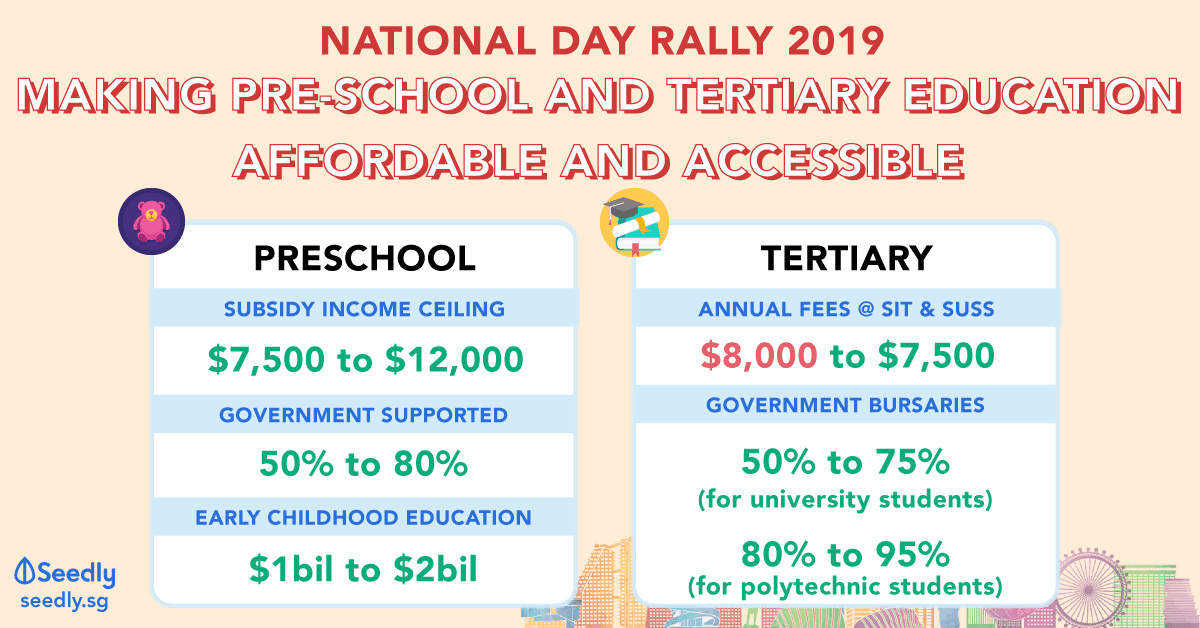National Day Rally 2019: Making Pre-School And Tertiary Education Affordable And Accessible
After reading our summary of the National Day Rally 2019, you’re probably here because you’re concerned about the announcements made with regard to pre-school and tertiary education.
Well, considering that we place so much importance on the only asset which Singapore has: people.
It’s good to hear that PM Lee highlighted the importance of education as well as the need to ensure that our education system is as accessible as possible.
Most importantly, the government has recognised that preschools now serve as the new starting point for education since a child’s formative years are highly critical.
From doubling full-day pre-school capacity to almost 180,000 places (since 2012), to establishing the National Institute of Early Childhood Development (NIEC) to train preschool teachers so that they receive better education and career progression.
Much has been done to improve the state of our pre-school education system.
But what else was announced during this NDP Rally 2019? And what are the changes to tertiary education?
Let’s find out!
For Families With Little Ones: More Financial Support For Pre-School
Currently, families with a monthly household income of up to $7,500 and with mothers or single fathers who work at least 56 hours a month are eligible for extra subsidies.
This income ceiling will be raised to $12,000 which extends these subsidies to another 30,000 households.
The Government will also increase pre-school subsidies “across the board” – although PM Lee did not state specifically how much.

But more importantly, the enhanced subsidies will effectively bring full-day pre-school expenses to around $300 per child, which is about the same total cost for primary school and after-school student care.
To further ensure that pre-school education is kept “good and affordable”, like housing and healthcare, the number of pre-schools that are government-supported will be raised from 50 per cent to 80 per cent.
PM Lee also promised that the government will more than double its current annual spending of $1 billion on early childhood education over the next few years.
Hopefully, this translates into more standard curriculums and an increased focus on bilingualism to better equip our children for the future.
Main takeaway: pre-school will no longer be an expensive phase when bringing up your kids.
For Families With Children Attending Tertiary Institutions: Lower Tertiary Fees And Higher Government Bursaries
Following an MOE review of tertiary fees and bursaries, PM Lee reported the following changes:
Tertiary Fees

The annual fees for full-time general degree students at the Singapore Institute of Technology (SIT) and the Singapore University of Social Sciences (SUSS) will be lowered from around $8,000 to $7,500.
Government Bursaries
For government bursaries:
- University students will get coverage of up to 75 per cent of their degree fees, up from 50 per cent
- Polytechnic students will get coverage of up to 95 per cent of their diploma fees, up from 80 per cent.
These bursary enhancements will also be applicable for students pursuing tertiary level education at:
- Institute of Technical Education
- Lasalle College of the Arts
- Nanyang Academy of Fine Arts
The fees and bursary enhancements will kick in from the next academic year.
Main takeaway: tertiary education is now more accessible than ever
For Aspiring Doctors: More Financial Support
Have straight As and want to study medicine in order to serve the greater good?
Did you know that even with government subsidies, medical school fees will cost you almost $29,000 per year at NUS and $35,000 at NTU?

The government has recognised this and in their bid to uphold Singapore’s open meritocracy and the belief that “everyone should have the opportunity to start well in life, regardless of circumstances”.
Medical bursaries for medical school will be enhanced significantly more than bursaries for other courses.
Lower-income students who choose to pursue medicine will effectively pay only about $5,000 per year.
Main takeaway: the only thing stopping you from becoming a doctor is your grades.
Advertisement

